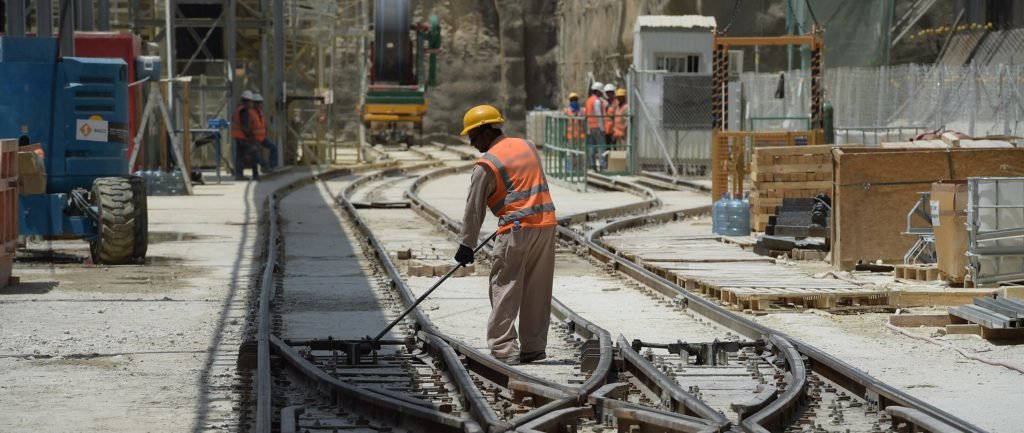
Amnesty International Exposes a Decade of Exploitation Behind Riyadh Metro Construction
Migrant workers who travelled to Saudi Arabia to work on the Riyadh Metro project report having paid exorbitant recruitment fees, endured dangerous heat and earned pitiful wages over a decade of serious abuse, according to a new report by Amnesty International. The investigation, titled “Nobody wants to work in these situations”: A decade of exploitation on the Riyadh Metro project, documents labour abuses on one of Saudi Arabia’s flagship infrastructure projects.
Promoted by the Saudi government as the “backbone” of the capital’s public-transport system, the newly opened metro was built by leading international and Saudi firms under state direction and is slated for further expansion. However, many of the workers interviewed said they were charged illegal recruitment fees in their home countries and then endured long, arduous hours in hazardous conditions for minimal, discriminatory pay.
Amnesty International’s Programme Director for Climate, Economic Social Justice and Corporate Accountability, Marta Schaaf, said: “The Riyadh Metro is hailed as the backbone of the capital’s transport system, yet beneath its sleek exterior lies a decade of abuses enabled by a labour system that sacrifices migrant workers’ human rights. Already burdened with exorbitant recruitment fees, these workers endured punishing hours for meagre wages.”
Her conclusion: “Their hardships were compounded by exposure to extreme heat in a country where temperatures are soaring thanks to human-induced climate change. That such abuses persisted for years across multiple companies on a flagship infrastructure project exposes a glaring failure by the government to enforce protections and dismantle a system that leaves workers at high risk of exploitation.”
Amnesty interviewed thirty-eight men from Bangladesh, India and Nepal who were employed by a range of foreign and Saudi companies—main contractors, subcontractors and labour suppliers—working on the Riyadh Metro between 2014 and 2025. For nearly all, the abuse began before they left their home countries, when they were asked to pay between US$ 700 and US$ 3,500 in recruitment fees and related costs to agents in their origin countries, forcing many into serious debt and exacerbating their exposure to further abuse.
One Nepalese worker, Suman, described how he sold his wife’s family savings in gold to afford the fees for a job paying a basic salary of just US$ 266 each month. “I paid 100,000 rupees (US$ 700) to the manpower agent. But during preparatory work – travel, medical tests and other paperwork – I spent a total of 200,000 rupees (US$ 1,400). I didn’t have money at that time… I borrowed some gold from my wife’s parents, sold it… As the price of gold increased, I paid back almost double for that. It took me six months to pay off the loans.”
Once in Saudi Arabia, many workers reported hourly rates of less than US$ 2, while some said they earned barely half of that in their roles as labourers, cleaners or office assistants on the Riyadh Metro project. Virtually all said they worked 60-plus hour weeks. Though most said they were not directly forced into overtime, the basic salary was so low that they felt they had no choice. The government’s failure to set a universal living wage entrenches low pay among migrant workers—most of whom are racialised—denying many a decent standard of living.
One Indian worker, Janak, said he faced pressure from senior staff at his subcontractor to work in extreme heat: “The foremen and engineers would force us to work overtime even in hot temperatures. We would say, ‘We can’t. It’s extremely hot.’ But they would say, ‘Keep working’… What can poor people do? We have to work. We have to do a difficult job.” Meanwhile, a Nepalese worker, Indra, said: “When I work in the extreme heat, I feel like I’m in hell… I think – How did I end up here? Did I commit anything wrong so that God is punishing me? Nobody wants to work in these situations by their choice. But what can I do? I didn’t have a job in Nepal. I came here to support my family. So, I must be ready to suffer.”
Workers also reported additional abuses such as passport confiscation, overcrowded and unsanitary living conditions, poor-quality food, and discriminatory treatment based on job rank. The experiences underline not only the Saudi government’s failings but also the high-risk environment in which companies—including large multinationals—operate when they engage in the Kingdom’s construction sector, which depends heavily on a vast subcontracting network.
Despite limited reforms, the kafala system persists in practice. Combined with weak enforcement of labour protections—including inspections that focus more on Saudisation targets and employment-legality than on safeguarding rights—and a recent reduction of penalties for abusive labour practices, this creates a permissive climate for exploitation. The context demands that companies proactively undertake heightened human rights due diligence when doing business in Saudi Arabia. “For companies operating in or entering Saudi Arabia, these findings should serve as a clear warning: comprehensive human rights due-diligence is not optional,” said Marta Schaaf.
“As Saudi Arabia pushes ahead with high-profile giga-projects, including the 2034 men’s football World Cup, the authorities must completely dismantle the kafala sponsorship system and rigorously enforce labour laws in line with global human rights standards. Strengthening safeguards and ensuring accountability for the millions of migrant workers who make these ventures possible is the only way to ensure they are no longer treated as disposable.”
Amnesty also called on the origin countries—Bangladesh, India and Nepal—to take responsibility for protecting their nationals by monitoring, investigating and sanctioning the illegal conduct of recruitment agencies. Without proper accountability across all countries involved, the cycle of abuse will persist.







